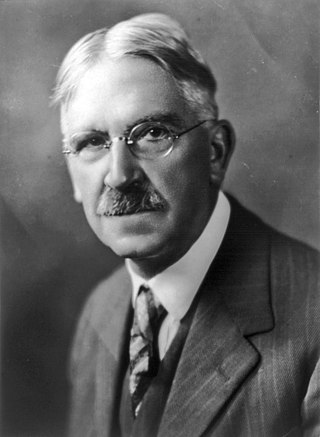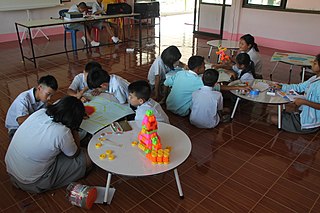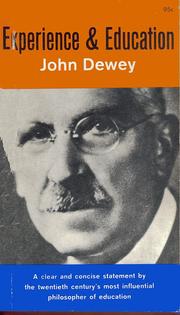Progressive education, or educational progressivism, is a pedagogical movement that began in the late 19th century and has persisted in various forms to the present. In Europe, progressive education took the form of the New Education Movement. The term progressive was engaged to distinguish this education from the traditional curricula of the 19th century, which was rooted in classical preparation for the early-industrial university and strongly differentiated by social class. By contrast, progressive education finds its roots in modern, post-industrial experience. Most progressive education programs have these qualities in common:
Educational psychology is the branch of psychology concerned with the scientific study of human learning. The study of learning processes, from both cognitive and behavioral perspectives, allows researchers to understand individual differences in intelligence, cognitive development, affect, motivation, self-regulation, and self-concept, as well as their role in learning. The field of educational psychology relies heavily on quantitative methods, including testing and measurement, to enhance educational activities related to instructional design, classroom management, and assessment, which serve to facilitate learning processes in various educational settings across the lifespan.

John Dewey was an American philosopher, psychologist, and educational reformer. He was one of the most prominent American scholars in the first half of the twentieth century.
The philosophy of education is the branch of applied philosophy that investigates the nature of education as well as its aims and problems. It also examines the concepts and presuppositions of education theories. It is an interdisciplinary field that draws inspiration from various disciplines both within and outside philosophy, like ethics, political philosophy, psychology, and sociology. Many of its theories focus specifically on education in schools but it also encompasses other forms of education. Its theories are often divided into descriptive theories, which provide a value-neutral description of what education is, and normative theories, which investigate how education should be practiced.
Student-centered learning, also known as learner-centered education, broadly encompasses methods of teaching that shift the focus of instruction from the teacher to the student. In original usage, student-centered learning aims to develop learner autonomy and independence by putting responsibility for the learning path in the hands of students by imparting to them skills, and the basis on how to learn a specific subject and schemata required to measure up to the specific performance requirement. Student-centered instruction focuses on skills and practices that enable lifelong learning and independent problem-solving. Student-centered learning theory and practice are based on the constructivist learning theory that emphasizes the learner's critical role in constructing meaning from new information and prior experience.

Pedagogy, most commonly understood as the approach to teaching, is the theory and practice of learning, and how this process influences, and is influenced by, the social, political, and psychological development of learners. Pedagogy, taken as an academic discipline, is the study of how knowledge and skills are imparted in an educational context, and it considers the interactions that take place during learning. Both the theory and practice of pedagogy vary greatly as they reflect different social, political, and cultural contexts.

Experiential education is a philosophy of education that describes the process that occurs between a teacher and student that infuses direct experience with the learning environment and content. This concept is distinct from experiential learning, however experiential learning is a subfield and operates under the methodologies associated with experiential education. The Association for Experiential Education regards experiential education as "a philosophy that informs many methodologies in which educators purposefully engage with learners in direct experience and focused reflection in order to increase knowledge, develop skills, clarify values, and develop people's capacity to contribute to their communities". The Journal of Experiential Education publishes peer-reviewed empirical and theoretical academic research within the field.

In education, a curriculum is the totality of student experiences that occur in an educational process. The term often refers specifically to a planned sequence of instruction, or to a view of the student's experiences in terms of the educator's or school's instructional goals. A curriculum may incorporate the planned interaction of pupils with instructional content, materials, resources, and processes for evaluating the attainment of educational objectives. Curricula are split into several categories: the explicit, the implicit, the excluded, and the extracurricular.

Experiential learning (ExL) is the process of learning through experience, and is more narrowly defined as "learning through reflection on doing". Hands-on learning can be a form of experiential learning, but does not necessarily involve students reflecting on their product. Experiential learning is distinct from rote or didactic learning, in which the learner plays a comparatively passive role. It is related to, but not synonymous with, other forms of active learning such as action learning, adventure learning, free-choice learning, cooperative learning, service-learning, and situated learning.

Constructivism in education is a theory that suggests that learners do not passively acquire knowledge through direct instruction. Instead, they construct their understanding through experiences and social interaction, integrating new information with their existing knowledge. This theory originates from Swiss developmental psychologist Jean Piaget's theory of cognitive development.

Project-based learning is a teaching method that involves a dynamic classroom approach in which it is believed that students acquire a deeper knowledge through active exploration of real-world challenges and problems. Students learn about a subject by working for an extended period of time to investigate and respond to a complex question, challenge, or problem. It is a style of active learning and inquiry-based learning. Project-based learning contrasts with paper-based, rote memorization, or teacher-led instruction that presents established facts or portrays a smooth path to knowledge by instead posing questions, problems, or scenarios.

Democratic education is a type of formal education that is organized democratically, so that students can manage their own learning and participate in the governance of their school. Democratic education is often specifically emancipatory, with the students' voices being equal to the teacher's.
Culturally relevant teaching is instruction that takes into account students' cultural differences. Making education culturally relevant is thought to improve academic achievement, but understandings of the construct have developed over time Key characteristics and principles define the term, and research has allowed for the development and sharing of guidelines and associated teaching practices. Although examples of culturally relevant teaching programs exist, implementing it can be challenging.
Holistic education is a movement in education that seeks to engage all aspects of the learner, including mind, body, and spirit. Its philosophy, which is also identified as holistic learning theory, is based on the premise that each person finds identity, meaning, and purpose in life through connections to their local community, to the natural world, and to humanitarian values such as compassion and peace.
Social pedagogy describes a holistic and relationship-centred way of working in care and educational settings with people across the course of their lives. In many countries across Europe, it has a long-standing tradition as a field of practice and academic discipline concerned with addressing social inequality and facilitating social change by nurturing learning, well-being and connection both at an individual and community level. The term 'pedagogy' originates from the Greek pais (child) and agein, with the prefix 'social' emphasising that upbringing is not only the responsibility of parents but a shared responsibility of society. Social pedagogy has therefore evolved in somewhat different ways in different countries and reflects cultural and societal norms, attitudes and notions of education and upbringing, of the relationship between the individual and society, and of social welfare provision for its marginalised members. Social pedagogues work within a range of different settings, from early years through adulthood to working with disadvantaged adult groups as well as older people. To achieve a holistic perspective within each of these settings, social pedagogy draws together theories and concepts from related disciplines such as sociology, psychology, education, philosophy, medical sciences, and social work.
Social learning is learning that takes place at a wider scale than individual or group learning, up to a societal scale, through social interaction between peers.
Curriculum theory (CT) is an academic discipline devoted to examining and shaping educational curricula. There are many interpretations of CT, being as narrow as the dynamics of the learning process of one child in a classroom to the lifelong learning path an individual takes. CT can be approached from the educational, philosophical, psychological and sociological perspectives. James MacDonald states "one central concern of theorists is identifying the fundamental unit of curriculum with which to build conceptual systems. Whether this be rational decisions, action processes, language patterns, or any other potential unit has not been agreed upon by the theorists." Curriculum theory is fundamentally concerned with values, the historical analysis of curriculum, ways of viewing current educational curriculum and policy decisions, and theorizing about the curricula of the future.
Inquiry-based learning is a form of active learning that starts by posing questions, problems or scenarios. It contrasts with traditional education, which generally relies on the teacher presenting facts and their knowledge about the subject. Inquiry-based learning is often assisted by a facilitator rather than a lecturer. Inquirers will identify and research issues and questions to develop knowledge or solutions. Inquiry-based learning includes problem-based learning, and is generally used in small-scale investigations and projects, as well as research. The inquiry-based instruction is principally very closely related to the development and practice of thinking and problem-solving skills.

Experience and Education is a short book written in 1938 by John Dewey, a pre-eminent educational theorist of the 20th century. It provides a concise and powerful analysis of education. In this and his other writings on education, Dewey continually emphasizes experience, experiment, purposeful learning, freedom, and other concepts of progressive education. Dewey argues that the quality of an educational experience is critical and stresses the importance of the social and interactive processes of learning.

Educational management refers to the administration of the education system in which a group combines human and material resources to supervise, plan, strategise, and implement structures to execute an education system. Education is the equipping of knowledge, skills, values, beliefs, habits, and attitudes with learning experiences. The education system is an ecosystem of professionals in educational institutions, such as government ministries, unions, statutory boards, agencies, and schools. The education system consists of political heads, principals, teaching staff, non-teaching staff, administrative personnel and other educational professionals working together to enrich and enhance. At all levels of the educational ecosystem, management is required; management involves the planning, organising, implementation, review, evaluation, and integration of an institution. Research in educational management should explore the dynamic interplay among educational leaders, their followers, and the broader community to enhance the quality of teaching and learning outcomes.









